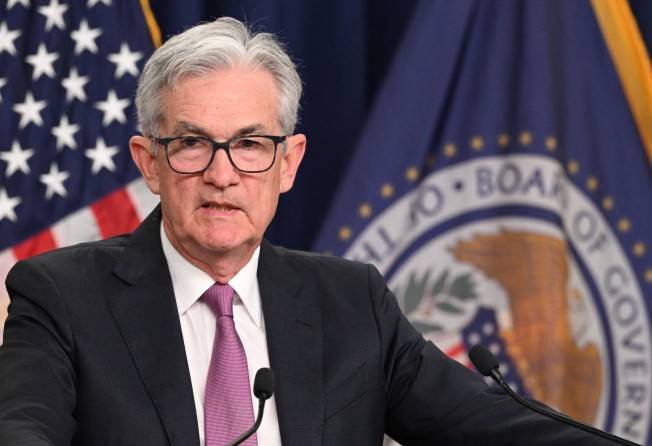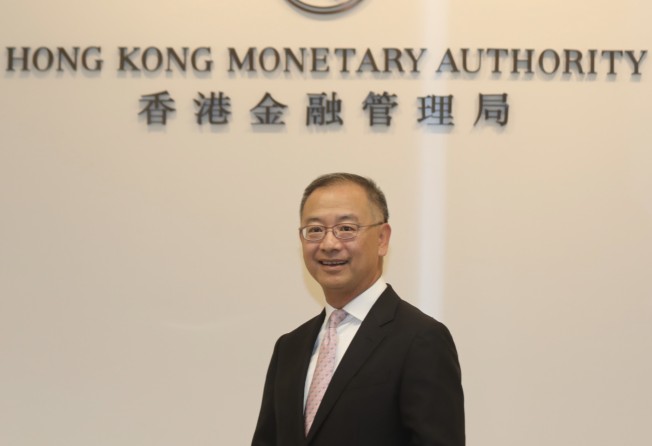
Hong Kong raises base rate by 75 basis points to 14-year high as Fed signals more pain and pledges to ‘keep at it’ to contain inflation
- The Hong Kong Monetary Authority raised its base rate to 3.5 per cent effective immediately, the highest level since March 2008
- All eyes are on Hong Kong’s other commercial lenders, after HSBC decided to lift its prime rate by 12.5 basis points, with effect from Friday

Hong Kong’s cost of borrowing increased for the fifth time in six months, prompting the city’s top financial official to warn of “negative growth” in the local economy as the de facto central bank followed the US Federal Reserve in raising its key interest rate.
The Hong Kong Monetary Authority (HKMA) lifted its base rate rose by 75 basis points to a 14-year high of 3.5 per cent with immediate effect, according to a statement on Thursday, hours after policymakers in the US raised the Fed funds target rate by the same quantum to between 3 and 3.25 per cent.
The cost of funds are at the highest in Hong Kong since March 2008 when the base rate was at 3.75 per cent during the global financial crisis. The HKMA has been conducting its monetary policy in lockstep with the Fed since 1983 to maintain the currency peg to the US dollar under the city’s linked exchange rate system.
The world’s most powerful monetary authority has now increased its key rate by 75 basis points three times in the past four months to tame runaway inflation. US consumer prices surged at an annual rate of 8.3 per cent in August, slower than the preceding two months but still hovering near a four-decade high.

“Interest rates will continue to rise [and] the level of bad debt in Hong Kong may gradually rise,” warned the HKMA’s chief executive Eddie Yue Wai-man after the rate decision. “However, the overall asset quality in the banking sector remains solid, and a slight increase in bad debt will not have any big impact on the banking industry as a whole.”
The Fed warned of more pain ahead, contrary to general market expectations, by pledging to “keep at it” – a nod to the 2018 book by former Fed chairman Paul Volcker – until monetary policy succeeds in lowering inflation to its target of 2 per cent or slower. In the post-meeting statement, the Fed’s open-market committee “anticipates that ongoing increases in the target range will be appropriate.”
The Fed’s hawkish language weighed on global stock markets, driving the S&P 500 index in New York down by 1.7 per cent. Yields on the two-year Treasury note topped 4 per cent, the highest since 2007.
As many as 20 of the Asia-Pacific region’s 27 major benchmarks declined on Thursday. Hong Kong’s Hang Seng Index fell by as much as 2.6 per cent to an 11-year low before recouping some of the losses to end the day 1.6 per cent lower.
Hong Kong’s currency weakened to 7.8500 against the US dollar, compelling the HKMA to intervene in the market to prevent it from breaking the trading band.

Still, the Fed refrained from increasing the key rate by a full percentage point, a quantum predicted by only one in four economists.
“The Fed did not opt for [the full point increase] to avoid giving the impression that inflation is out of control, which would dampen sentiments and increase the market’s volatility,” said Everbright Securities International’s global market and forex strategist Kirk Wong. The inflation data has entered the so-called “platform period without setting new highs since June, reducing the pressure on any sharp hikes in rates,” he added.
HSBC took the lead among commercial banks by raising its prime rate or the rate it charges its best customers, by from 5 per cent to a four-year high of 5.125 per cent, effective Friday, according to a statement. The rate on Hong Kong dollar deposits will increase by 12.4 basis points, it added.
Banks are free to determine their prime rates, used as the benchmark for mortgages, corporate loans and personal loans. Before Thursday, Hong Kong’s prime rate is at between 5 and 5.25 per cent among the city’s five largest banks, a level that kept steady throughout the four times since March when the Fed and the HKMA raised their rates.
More banks could follow in the footsteps of HSBC given the rate pressure, said T.O. & Associates Consultancy’s managing director Tommy Ong. Hong Kong’s three-month interbank offered rate (Hibor) rose to 3.16 per cent, while the 12-month rate increased to a 14-year high of 4.13 per cent. Both Hibor rates are the highest since late 2008 and are more than 10 times of the levels at the beginning of 2022.
“The rise in prime rates will mainly affect the property market,” Ong said. “With effective mortgage rate of 3 per cent and rental yield of 2.4 per cent, the demand for investment property may decline further.”
The US interest rate rise has led to outflow from Hong Kong’s capital market as arbitrageurs engage in a so-called carry trades where they sell low-yielding assets (Hong Kong dollar) for higher-yielding instruments (US dollar) to profit from the rate differentials.
This has forced the HKMA to intervene in the market 31 times this year, buying a total of HK$213.96 billion of the local currency and selling US$27.26 billion of the US dollar, HKMA data showed. The authority bought HK$103.48 billion in 2018 and HK$22.13 billion in 2019 to bring the local currency within its trading band of between 7.7500 and 7.8500 per dollar.
“We do not see massive capital outflow from Hong Kong, as total [bank] deposits rose 0.4 per cent in the first half,” Yue said.
Hong Kong’s rate increase came at an inopportune moment for the local economy, which shrank by 1.4 per cent in the second quarter and 3.9 per cent in the preceding three months.
“Since the economic contraction was significant in the first half, it is highly likely that negative growth will be recorded for the full year,” Financial Secretary Paul Chan Mo-po said after the HKMA’s move, adding that the government will update its full-year economic forecast in November.
More than two years of Covid-19 curbs and quarantine rules had upended businesses, deterred visitors and drove almost all mass events into the ground, raising concerns about the city’s role as an international financial centre.
Travellers have avoided the city as Hong Kong still requires visitors to go through three days of hotel quarantine and four days of medical surveillance, even as most major cities around the world are living with Covid-19 and have removed most social-distancing and isolation controls.